The Hollywood Con Queen
She tormented studio executives, actors, makeup artists, security guys, photographers, screenwriters, athletes, even bobsledders and scuba divers for years—until corporate investigator Nicoletta Kotsianas was put on the case.

It was a warm, overcast afternoon in August 2019, and Joe Scarnici was pumped. A talented photographer who has gone on tour with Madonna, covered the red carpet at the Academy Awards, and worked on campaigns for Pepsi, Scarnici had just wrapped up a call with a new potential client about a big photo shoot. He grabbed some lunch and headed into his office/garage in San Juan Capistrano, California, to sketch out lighting ideas. Suddenly, the phone rang again, this time from a U.K. number. The caller, who had a British accent, introduced himself as Albert, an assistant to Christina Ong, a Singaporean entrepreneur nicknamed the “Queen of Bond Street,” after London’s toniest shopping district, where Ong owns a number of designer stores.
Ong was looking to hire a photographer to shoot a handful of Indonesian athletes she was sponsoring to participate in the Tokyo 2020 Olympics, Albert explained. If Scarnici was interested, she would call him directly to tell him more. Sure, he said, and 15 minutes later—just enough time for him to run a quick Google search on the reclusive billionaire—Scarnici’s cell phone lit up again. “My first impression was ‘Wow, why is this person reaching out to me?’ ” he recalls. “Because the richest woman in Singapore calling me in my garage just seemed a little fantastic.” Ong, who said she’d been passed Scarnici’s details by Martha Stewart’s assistant (Scarnici shot Stewart for a cookbook launch in 2016), was quick to put the photographer at ease, telling him he’d been highly recommended, before steering the conversation onto yoga, revealing she had a private studio in her house. Did Scarnici ever practice yoga? When he said he’d just done a session that morning, Ong seemed pleased. “Oh, we’re going to get along great,” she purred.
After the call, Albert swiftly sent over a nondisclosure agreement and then a detailed schedule for Scarnici’s six-day trip to Southeast Asia, along with a contract worth $36,000 (his fee plus expenses) and athlete bios. Within 48 hours, Scarnici was hugging his wife and children—one of whom was just two weeks old—goodbye and boarding a plane to Hong Kong, where he would catch a flight to Indonesia.
But the trip turned out to be a bust. None of the promised subjects turned up—and neither did Ong; instead, at the entrepreneur’s request, Scarnici spent most of the time being chauffeured around Jakarta scouting gyms to use as backdrops while hoping that an athlete might finally make an appearance. The no-show was unusual, Scarnici reasoned, but not unheard of; he’d once spent a week in Europe waiting for a legendary soccer player to make himself available for a shoot. At Ong’s urging, he extended the trip by two days, bailing on a couple of small jobs he had booked back home. But when the talent still failed to materialize, he got on a flight home before the weekend; he was due in New York City on Monday to work with a major sports brand, and there was no way he could cancel. Sympathetic, Ong told him to invoice for his fee and the expenses he’d incurred, which included his flight to Jakarta and various things he’d been asked to pay cash for up front, including his driver, hotel, and food, all the while expressing her wish that once she pinned down the athletes, Scarnici would return to Indonesia and finish the job.
On Monday evening in New York City, Scarnici, his assistant, and another photographer headed for dinner in Midtown. As Scarnici was recounting his Indonesian adventure, Albert rang, saying Ong wanted to speak to him. He and Ong had been calling incessantly since Scarnici left Jakarta to discuss his return. As he paced up and down the sidewalk outside the restaurant, he explained with a touch of embarrassment that he just didn’t have the funds to fly back before he was reimbursed for the first trip.
Ong changed her tactic. She asked whether Scarnici would be willing to meet her privately instead to initiate a “discreet relationship” and needled him to blow her a kiss over the telephone. “In my head, I’m picturing a 72-year-old uber-rich woman in Singapore blowing me kisses, telling me she wants to fly me to Japan,” Scarnici recalls. Now “really weirded out,” he politely declined, and Ong hung up in a huff. Albert immediately called back, asking what Scarnici had said to upset his boss. He dismissed her indecent proposal as “something that was lost in translation.” Still trying to wrap his head around the exchange, Scarnici glanced up to see his assistant running toward him while typing furiously into his cell phone. He held it up for Scarnici to read: “THIS IS A SCAM!”

Chinese-American philanthropist who was impersonated by the con artist.
While Scarnici was outside, his dinner companions had done some digging and stumbled across a blog post from Carley Rudd, a New York–based travel photographer, titled “Travel Scam Alert: I Was Victim to an International Travel Photographer Scam in Indonesia.” In it, Rudd described how a woman claiming to be Chinese-American philanthropist Wendi Murdoch had hired her to take photographs in Jakarta for an exhibition tied to the Beijing 2022 Winter Olympics. After shelling out for airfare and food (under the assumption that these expenses were already being reimbursed via a wire transfer) and spending $1,400 in cash on a photography permit, Rudd began to sense some “red flags,” she says. On the second day of the trip, Rudd was asked to hand over yet more money and split from her husband, who had accompanied her. She refused, so the person pretending to be Murdoch said her assistant, a New Yorker named Aaron, would call to discuss further. He never did. When Rudd tried to ring him, “it went straight to this kind of automated British-accent voicemail saying this number is no longer in service,” she tells MC. “As soon as I heard that message, my stomach sank and I just cried.” Rudd realized she’d been targeted by a sophisticated con artist who had pocketed the $1,400 she’d handed over to the driver for the “photography permit” and had no intention of reimbursing her, let alone paying her fee. “I think it was $15,000 for business-class flights that I put on my credit card that I won’t see back,” she says. “That’s the biggest mental block for me.”
Stay In The Know
Get exclusive access to fashion and beauty trends, hot-off-the-press celebrity news, and more.
With Albert still jabbering in his ear about returning to Jakarta, Scarnici frantically scrolled through Rudd’s blog post. There was no denying it was the same scam and that Ong had been impersonated. “The first thing I saw on the blog was the photo of the driver I just spent eight days with,” he recalls. Using every ounce of his restraint, Scarnici hung up and immediately contacted the FBI. After yet another call from Albert the following morning—in which he continued to assure Scarnici the invoice was being processed, and when could he return to Indonesia?—he never heard from either Albert or Ong again. Altogether, Scarnici lost about $15,000. He still hasn’t fully processed what happened. “I give the con artist credit in a weird way,” he says. “It was just like any other job until it wasn’t.”
Scarnici, it turns out, was just the latest in a long line of victims who have fallen prey to a prolific scammer nicknamed by the media “the Con Queen of Hollywood.” And with most cases’ meager cash value, multijurisdictional complications, and absence of any physical threat, the FBI had no interest. It was hard to prove crimes had even taken place, rather than simply business deals gone wrong, allowing the con artist to operate for years with impunity. Until one night when the case dropped into the lap of a corporate investigator named Nicoletta Kotsianas, who soon found herself in a high-speed cyber chase through the Con Queen’s elaborate imaginary world.
Kotsianas is a senior director at corporate investigations firm K2 Intelligence, which offers investigative, compliance, and cyber-defense services. Its investigators have worked on behalf of Bernie Madoff’s victims to try to recover as much money as possible. More recently, they were hired to conduct investigations at universities in light of the Varsity Blues college-admissions scandal; they have also worked for “democratic governments in foreign countries,” tracing assets embezzled by previous regimes. The firm was founded in 2009 by father and son Jules and Jeremy Kroll—the former widely considered to be the originator of the modern-day corporate-intelligence industry—and today boasts seven offices across the United States and Europe, employing a staff of about 350, about half of whom are women. “Women are, generally speaking, better listeners,” Jules Kroll says. “And here was a case where it really cried out for somebody to understand what we thought was a female con artist.”
Kotsianas joined in 2015. Now 38 years old, she is quick thinking and detail oriented, and she possesses a mild dramatic flair—she was big on theater in school—particularly when reenacting conversations. Her usual specialty is investigations and litigation support, asset tracing and recovery, and due diligence, “which is, you know, being brought in to find the needle in the haystack,” she explains. Like many of her colleagues at K2 Intelligence, Kotsianas originally trained as a reporter. She worked at the Financial Times, and her beat was financial markets with a focus on debt, meaning she had a “front-row seat” to the industry’s most turbulent period in living memory, the 2008 stock-market crash. “I covered all the biggest bankruptcies, including Lehman Brothers,” she says. From there, Kotsianas moved into due diligence at a bond-ratings agency before deciding she missed the more probing aspects of her old job, such as critical thinking and interviewing. Fortunately, the agency she worked for shared a building with K2 Intelligence. “And at one point, we were all on the same floor,” she says. “I knew that there was this company and it did corporate intelligence, but I didn’t really know what that was.” After striking up conversations with K2 Intelligence employees in the common kitchen and hallways, she realized being a corporate investigator sounded like the perfect fit.
Two years after joining the firm, following dinner at home with her two young children in October 2017, Kotsianas noticed a missed call from a Los Angeles lawyer she sometimes worked for. Parking the kids in front of the TV, she snuck into her bedroom to return the lawyer’s call. It turned out that one of his Hollywood clients, a high-profile female film producer (Kotsianas won’t disclose her name), was being impersonated in a spate of strange emails and phone calls. Was it something she could look into? Kotsianas thought it sounded pretty straightforward: shut down the fake email, run the phone number through public-records databases, and have an attorney send a cease-and-desist notice.
But the closer she looked, the stranger the case became. The impersonator was using the Hollywood producer’s identity to strike up conversations with production companies, talent managers, and even actors—sometimes to fish for information about fellow industry executives, but other times for something more. “We learned very quickly that some of these conversations turned sexual,” Kotsianas says. The con woman, it seemed, was enticing men into phone sex under the pretext of an audition, and in some cases it was more like a pseudo relationship. It was unclear whether the producer was the victim of a prank or a smear campaign, but, either way, the order was to shut it down. “They were calling people on the phone and having weird conversations,” she says. “We weren’t treating it like a law-enforcement referral.”
Until, that is, Kotsianas learned that sometimes the con went much further than phone calls. She began hearing that some of the victims had been convinced to fly to Jakarta, although at that point it was unclear why. “I hadn’t spoken to the victims yet,” Kotsianas explains, “so I didn’t know if it was drug trafficking, if it was prostitution …” Scouring the Web for mentions of previous Jakarta-related cons, she soon stumbled across an article published exactly one year earlier, on October 21, 2016, in The Hollywood Reporter. It detailed an elaborate scam in which British makeup artists were being asked to fly to Indonesia to work on a blockbuster Chinese action film. Upon arrival in Jakarta, the women were each instructed to hand over at least $1,200 in cash—sometimes multiple times—to their driver, ostensibly for his services, which they were promised would be reimbursed by wire transfer on top of their substantial fees.

After they spent two or three days being chauffeured around the city on research missions, however, a long-promised interview with the female Chinese film producer would be canceled for one spurious reason or another, and the disappointed makeup artists would return home, file an invoice for their expenses, and wait for the money to show up in their account. It never did. “I was pretty sure I was going to get the money back,” says London-based makeup artist Anna Cichon, who was deceived into flying out to Jakarta twice in the space of three weeks in the summer of 2016. “They sent me a receipt from their bank.” After the second trip, however, the producer stopped responding to her emails and Cichon understood she’d been had. She lost a total of almost $8,000, which included the cost of business-class flights (the only ones available on short notice), food, and other expenses. “You always think, Oh, it’s not going to be me,” she says, tearing up over the phone.
Kotsianas, by now working with the rest of K2 Intelligence’s Investigations and Disputes team, which is made up of about 100 investigators and led by executive managing director Snežana Gebauer, soon established that the modus operandi in the Chinese film scam had many similarities to the one the Hollywood impersonator was using. The case had taken a dark—and significant—turn. “That’s what started to allow us to understand, this wasn’t just our client,” Kotsianas says. “We were dealing with something that had been going on longer than we understood and had taken in many more people than we were aware of.”
The team quickly adopted a multipronged approach. On one hand, there was “really old-school investigative work,” says Kotsianas, which involved countless interviews and fact gathering. On the other, there was digital investigative work like painstaking trawling through databases. With the identity of the con woman still unknown, the Hollywood producer filed suit against John Doe, which gave her the power to subpoena websites to hand over any information they held about the scammer. “Scammers know that subpoenas can turn things up, so they’ll use fake information,” Kotsianas says. “But sometimes they leave fingerprints.” The producer’s lawyer subpoenaed more than 20 companies, including Internet providers, domain-name registrars, and hotel-booking websites. (To give her enterprise credibility, the con woman always prebooked a Jakarta hotel room for her victims; occasionally, when she was feeling generous, she even paid for it.)
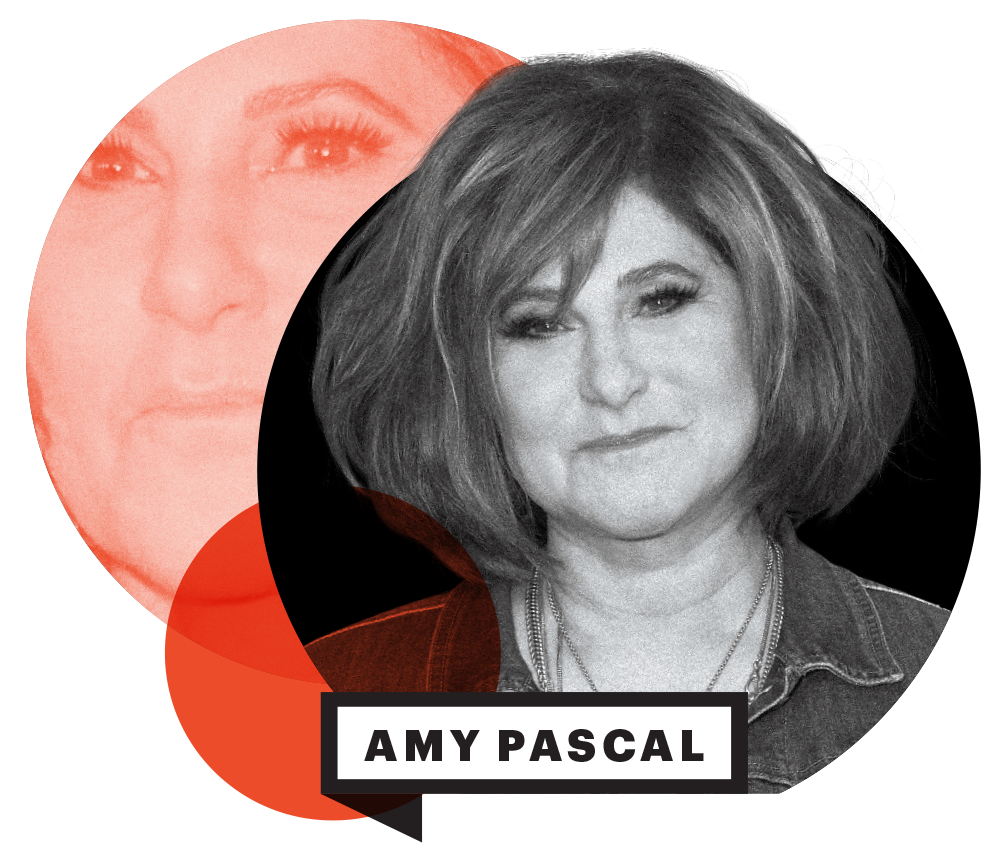
Former head of Sony Pictures impersonated by the scammer.
As team members at K2 Intelligence began combing through the evidence, they discovered their original client was not the only individual being impersonated; there were dozens of high-profile or high-net-worth figures, many of whom were women. Grouped together, their names read like the VIP guest list at an Academy Awards after-party. There was Lucasfilm president Kathleen Kennedy, former Sony Pictures chair Amy Pascal, Marvel Studios executive vice president of production Victoria Alonso, and longtime Warner Bros. collaborator Deborah Snyder, who was a producer on Man of Steel and Wonder Woman. (While K2 Intelligence wouldn’t confirm the names of its clients, these are some of the executives Marie Claire was able to independently verify were impersonated.)
Even more surprising was the number of people flying to Jakarta hoping to land a dream job. “I was amazed,” says Kotsianas. “It was constant—constant: ‘I was there this day,’ ‘I was there the next week,’ the next week, the next week.” In some cases, victims were almost overlapping. Lured by the promise of work on the same Chinese movie offered to Anna Cichon, South African makeup artist Heather Pitchford also flew to Jakarta in July 2016. During one stop on the itinerary she’d been given, an Indonesian local heard Pitchford speaking English and asked whether she was working on a film production. It turned out the local had learned about the supposed film from Cichon just a few days earlier and both makeup artists had completed an identical itinerary within a week of each other. Only afterward did Cichon and Pitchford realize the itinerary had been designed to keep them trapped for hours in Jakarta’s notoriously bad traffic so the con woman had an excuse to cancel her meetings with them. In another instance, the scammer contacted a British talent manager and persuaded her to send two actors to Jakarta, supposedly for auditions, within days of each other.
It wasn’t just British film-industry professionals being targeted. Victims hailed from a variety of countries and professions. “Actors, makeup artists, security guys, photographers, screenwriters,” Kotsianas ticks off on her fingers. “Bobsledders, athletes, mountain climbers, scuba divers.” Bobsledders? “You’re an expert on this thing,” Kotsianas says, mimicking the scammer’s sales pitch. “I’m interested in expanding into Asia.” Still, though, bobsledders? In the same way the con woman had effortlessly moved from impersonating Chinese producers to American ones, after word got out about her original tactic, she simply gave herself another makeover. Now she was posing as female entrepreneurs, philanthropists, and socialites such as Murdoch, the ex-wife of media mogul Rupert Murdoch, Christine Schwarzman, spouse of billionaire Blackstone Group cofounder Stephen A. Schwarzman, and even a little-known heiress to a Mexican distilling fortune. “It was whack-a-mole,” says Kotsianas. “We would get a domain shut down, we would get an email shut down, and then a new one would pop up.”
Like the fraudulent email addresses (most were from registered domains and sometimes Outlook), the websites were used to impersonate the high-profile women’s companies or foundations in order to further convince victims of the scam’s legitimacy. As the K2 Intelligence team encountered an ever-increasing number of websites, it began to map out a network of domains with “shared commonalities,” and it included not only those women who had already been impersonated but also those who were going to be faked next. “I was like, this isn’t going to stop,” Kotsianas says she realized only a few months into the investigation. “This is a road map to the scam.”
At one point during the investigation, Kotsianas believes, she even spoke directly to the Con Queen, although she didn’t realize it was her at the time. “I knew there were cutouts doing different pieces of it,” Kotsianas explains. (In the lexicon of espionage, a cutout is someone who acts as an intermediary.) In this case, the con woman was employing cutouts to set up the more technical aspects, such as the websites and emails. One morning, on a rare child-free weekend when Kotsianas was away with her husband, her phone began ringing during brunch—and didn’t stop. “I finally picked up and went outside,” she recalls. “And that was the first strange conversation with this person.” The caller, who went on to ring Kotsianas again a handful of times before eventually disappearing, claimed to be a cutout who had been cruelly tricked into helping the con woman. Despite the caller’s protests of innocence, “from that point on, my mind kept coming back to this person,” Kotsianas says.
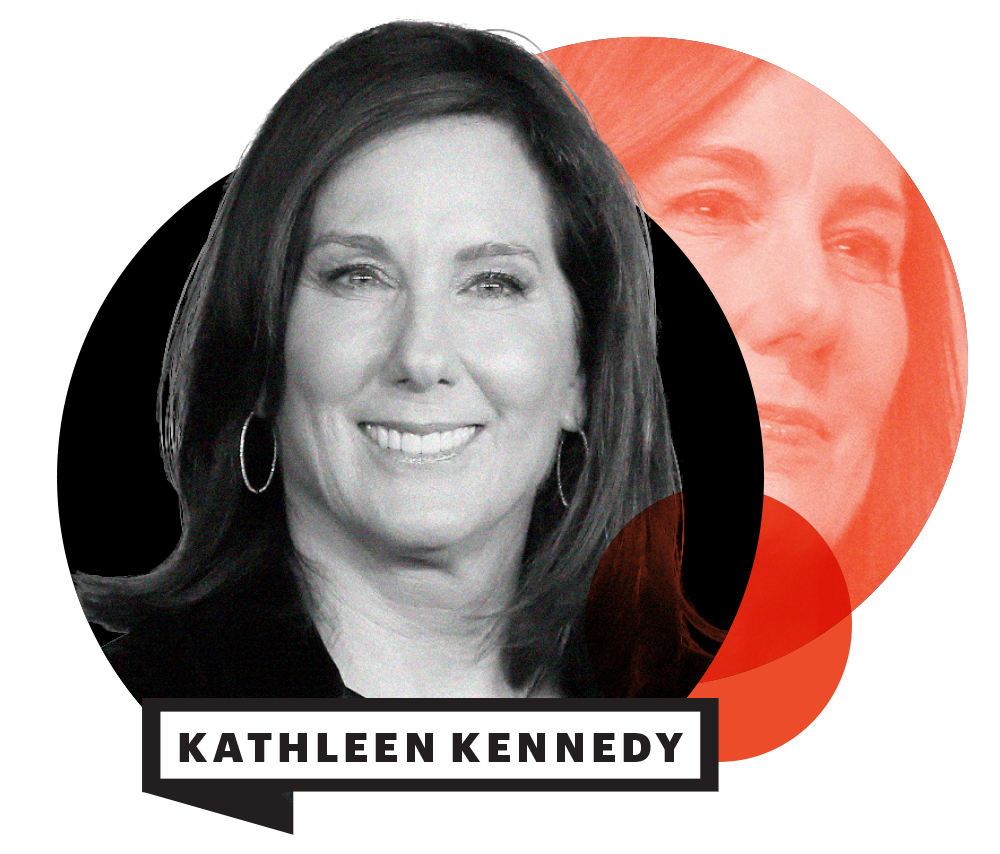
Lucasfilm president whose name was used to scam victims
The intensity of the investigation had begun to seep into her life outside the office. Kotsianas spent a vacation in Greece fielding calls from victims—many of them in their 20s and early 30s—who had been tricked into flying to Indonesia, at times speaking to them while they were still there. She would stay on the line while they walked through the airport, frightened and broke, with the con artist attempting to call them every few minutes. “I’ve heard from moms and dads who are crying, [saying,] ‘I can’t believe they would go’ and ‘They didn’t tell me,’ ” she says. Sometimes, after her own kids were in bed, Kotsianas would sit at her computer and spend the evening investigating leads. In the mornings, she woke up thinking about it. “In all the cases that we do, you have those moments where it’s going into your dreams,” she says.
For the victims, however, her steady presence proved invaluable. American Hustle producer Andy Horwitz, who was touched by the scam twice—once when he learned his personal trainer had been conned into traveling to Indonesia and again, two years later, when he discovered his name had been used by the con artist to initiate contact with an actor who was then tricked into phone sex—is full of praise for Kotsianas. “She went way above and beyond just working for whoever hired her. She really was a true warrior,” he says. “We didn’t hire her, we didn’t pay her, but she was so helpful. It felt like she really did care.”
In fact, Kotsianas reveals, there was sometimes no paying client. Once she’d succeeded in shutting down domains and email addresses for each successive producer, they no longer had a reason to fund the investigation. But together, Gebauer and Kotsianas persuaded K2 Intelligence’s directors, including cofounder Jules Kroll, that the case was worth pursuing. “The people who were conned were hoping for a way to advance their professional careers and spending tens of thousands of dollars and enormous amounts of time only to find out they’d been scammed,” says Kroll. “So we decided, you know what? We’ll stay with the case.”
But there was one element of the scam that didn’t make sense. Although the victims were losing thousands of dollars, at least part of that was spent on airfare, and what the con artist was left with just didn’t correspond with the amount of effort she put in. “Other impersonation scams that I’ve personally investigated work within business hours,” Kotsianas acknowledges. “It’s a business: You’re clocking in, clocking out.” In this case, however, the Con Queen was keeping tabs on her victims long after she’d pocketed their cash, often calling them at all hours of the day and night, regardless of what time zone they were in.
A couple of days into makeup artist Heather Pitchford’s Jakarta trip, she was alerted to the scam by a film-industry contact who knew the actor supposedly attached to the Chinese film. She immediately returned to the airport, where she waited, traumatized, in a café for the next flight home. “My phone started ringing because the driver had gotten to my hotel and realized that I’d skipped out,” she says. “And my phone just rang and rang and rang and didn’t stop ringing, and every time it got to the end, she’d ring again.”
For those who deviated from the con woman’s itinerary or dared to question her, the blowback was intense. She would rage over the telephone or accuse them of racism. At other times, especially with men, she would become overly familiar. “It was very strange,” says Neil Aldridge, a British photographer who was lured to Indonesia by the con artist—posing as Christine Schwarzman—in April 2018. “She was talking about how she really felt that she could talk to me very easily and she enjoyed the connection we had in a short space of time.”
Convinced this was about more than money, K2 Intelligence brought in psychiatrist and psychoanalyst Kerry Sulkowicz. The obsession with high-powered women, Sulkowicz hypothesized, suggested some kind of childhood trauma. “Our mothers are all high-powered women when we’re children,” he points out. But where Sulkowicz was perhaps most insightful was in giving credence to a theory Kotsianas had long harbored: that the Con Queen wasn’t a queen at all; it was a king. “Even though the person was putting themselves forward at the beginning as a female, it was not entirely clear that it necessarily was a woman doing this,” says Sulkowicz. “Which turned out to be correct.”
At the very beginning of the investigation, Kotsianas says, “I thought it was two people.” From the information gleaned via the victims, it was clear the con artist wasn’t acting alone. There was the chauffeur in Jakarta, the cutouts doing the technical bits (registering domains and emails), and occasionally other hired help: secretaries, tour guides, even a Caucasian man who actually supervised some auditions in Jakarta in one of the earliest iterations of the scam. And then, of course, there was the male assistant who would always make the first overtures. As the Con Queen spoke to an increasing number of victims, it often seemed the assistant “played the largest role,” leading Kotsianas to suspect that the same individual was impersonating both the con artist and her underling.
In early 2018, even though the investigation was ongoing, Gebauer and Kotsianas took the unusual step of going public with the story in order to warn as many people as possible. The resulting article, published in The Hollywood Reporter in July 2018, prompted even more victims to come forward. Helpfully, a number of them had recorded their calls with both the Con Queen and her assistant after becoming suspicious. A few weeks after the article came out, the K2 Intelligence team was working in its open-plan office when Kotsianas started shouting. “I remember we heard screaming across the floor,” Gebauer recalls. “ ‘It’s a man! It’s a man!’ ” Armed with a handful of recordings, Kotsianas gathered staff around her desk to analyze the voices. “There were British accents, American accents, Asian accents, sometimes it sounded like a woman, other times it was a man,” Gebauer says, “but it was very obvious they were all the same person.”
They made that discovery by identifying characteristics that were similar throughout all of the calls. “There were turns of phrase, cadence, ways his tone would go up on certain words or sighs—things like that,” Kotsianas explains. “It was the personality coming through versus just the voice.” Most of all, however, Kotsianas kept thinking back to the person who had called her, claiming to have been manipulated by the con woman. “It became abundantly clear that this man I had spoken to was the person in all of those recordings—the mastermind himself.”
For some of the victims, particularly those who had been induced into sexual conversations, discovering they had been talking to a man felt like a further violation. Kotsianas was equally incensed. “What’s most offensive to me as a woman is the way he portrays women,” she says. “When they get angry, they’re shrill and manipulative and all these caricatures. These women have worked their entire careers to make their names, to get to the top of their industry, and he’s using casting-couch sexual innuendo and berating people and talking down to them, and a collection of awful things, none of which were accurate for any of the women I’ve interacted with as part of this.” In a post-#MeToo era, of course, such claims are also potentially career-destroying.
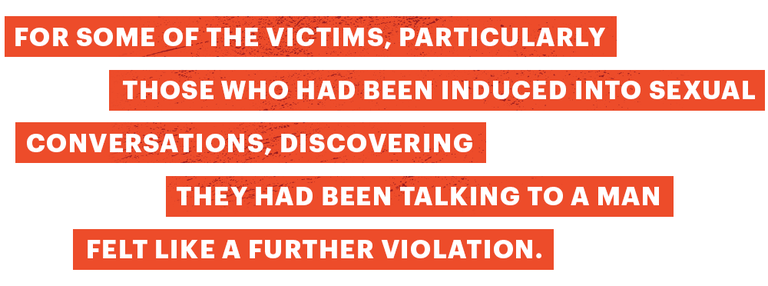
Victoria Alonso is executive vice president of production at Marvel Studios, where she is credited on 24 superhero movies, including Iron Man, Captain Marvel, Black Panther, and Spiderman: Far From Home, an unprecedented accomplishment in an industry long dominated by men. In April 2019, just days before the world premiere of Avengers: Endgame, a seminal moment in her career that had been over a decade in the making, Alonso found out she had been caught up in the con artist’s web after receiving an unsettling message from Endgame actor Josh Brolin. “He reached out to me and said, ‘Hey, I need to talk to you,’ ” Alonso recalls. “ ‘There’s a friend of mine that was [contacted by you] and asked to do something that seemed out of character for who you are. I don’t think this is real. Can I call you and talk?’ ” When they connected, Brolin explained that Alonso had allegedly told his friend, a stunt performer, that Marvel planned to replace Jeremy Renner as bow-and-arrow-wielding superhero Hawkeye. The fake Alonso then asked the stuntman to audition for the part over the telephone, and the call had quickly turned sexual.
The con artist possessed both an uncanny ability to impersonate Argentinian-born Alonso and insider knowledge of the film industry. (Last October, rumors surfaced that Marvel had considered replacing Renner after allegations emerged that he had threatened his ex-wife.) But the con artist seemed clueless on one point: Alonso is one of Hollywood’s foremost LGBTQ advocates and usually appears on red carpets with her wife, actress Imelda Corcoran. Still, Alonso was horrified. “That people would ever think for a second—for a second—that this was part of how I do things,” she says, “just makes me sick to my stomach.” Instead of spending the summer basking in Endgame’s box-office success (by July, the film had earned $2.79 billion worldwide, becoming the highest grossing film of all time), Alonso worked with K2 Intelligence and asked Marvel Studios and its parent company, Disney, to further investigate. “Very few times in my career, I’ve lost sleep over something,” she admits. “And this is definitely the one time where I just couldn’t believe that this was happening.”
Like many of the high-profile women who have been impersonated, however, Alonso was principally concerned for those who had been taken in by the imposter. “Most important, I felt for the people that were on the other side of the phone call,” she tells MC. “Because what this person does is, they go after somebody’s dream. That to me was the most hurtful and the dirtiest [aspect] of it all.” Similarly, former Paramount Pictures chairman and CEO Sherry Lansing was “horrified” to learn she had also been impersonated in the scam. “You’re preying on someone’s hopes, you’re preying on someone’s dreams,” she says in an interview with MC. “You’re preying on a particularly vulnerable population who all have artistic sensibilities, and it just breaks my heart to think that in any way, without my knowledge, I might have contributed to that.”
Many of those enticed into flying to Jakarta have yet to recover financially. Adrian Morris, a documentary and editorial photographer based in Spain, admits he was desperate for work when the con artist reached out to him. He now wonders if his outwardly glamorous social-media presence—filled with photographs of exotic locations—made him a target. “Maybe he thought that I had more money than I do or that I was more successful than I am because it kind of looks like that on my Instagram,” he says. “And then he just kind of got disappointed when he realized I didn’t have much.”
The brilliance of the con—and its inherent cruelty—is how much research the scammer conducts into all his victims, both the ones he is stealing from and those he impersonates. He always name-drops a mutual contact to introduce himself (in Scarnici’s case it was Martha Stewart; for Adrian Morris, an editor at Suitcase magazine), and often those who fall for the con are going through personal upheaval—divorce, money troubles, a new baby. The conceit of impersonating both a high-powered woman and her assistant allows him to play good cop/bad cop with his victims, and he uses anger and accusations of racism to confuse and intimidate them. “It’s tailored to your vulnerabilities, your potential weak spots, your background,” Kotsianas explains. It also helps, of course, that the con artist primarily targets freelancers in notoriously unstructured industries, where everyone is competing for a life-changing opportunity. “The impersonator exploited people’s weakness or association with celebrities or with having that Cinderella moment, your one big chance,” Gebauer agrees.
Since Kotsianas didn’t have the power to make arrests herself, she had a goal of getting the case to a point where she could hand it over to law enforcement. In May 2018, the FBI took an interest in the case and K2 Intelligence began sharing all the information it had amassed.
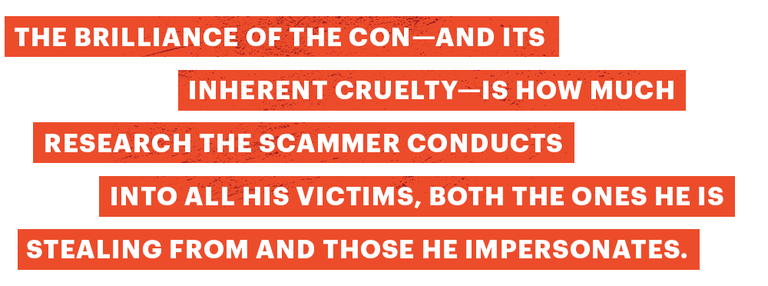
Over a year later, in July 2019, the FBI finally announced it was officially investigating the so-called Con Queen. “The FBI is seeking victims who may have traveled to Indonesia under the promise of a potential job offer from individuals purporting falsely to be well-known entertainment industry professionals,” the bureau stated in a press release, which announced the launch of an online questionnaire for victims of the scam to submit. “For it to reach the threshold of what the FBI wades into, it needed to be buttoned up in a way that shows the size and the scope of it,” Kotsianas explains. “Three or four victims—that’s not enough.” She estimates there are hundreds of victims who, between them, have lost hundreds of thousands of dollars—and those are just the ones Kotsianas is aware of. She believes the real number could be at least three times higher. However, even if the con artist is brought to justice—to face charges of wire fraud—it is unlikely victims will ever recoup any of their money.
Citing an ongoing investigation, the FBI declined to comment on the case, but now that the feds have their sights set on catching the con artist, it is hopefully only a matter of time before he is unmasked. “In a weird way, I have respect for how good this person is,” says Joe Scarnici. “I can’t wait to see what he looks like.” Neither can Hollywood. In a perverse twist of fate, movie executives—including some of those who have been impersonated—are already pondering how to bring the scammer’s story to the big screen. It would no doubt be a revelation that would delight the Con King. “I personally think he’s obsessed with Hollywood and entertainment,” says Kotsianas. “So it’s sort of a love letter, in a way, in his head. The women he chooses—he’s not doing it because he doesn’t like them or as a vendetta or anything. He thinks it’s the greatest honor to [impersonate] a powerful woman.”
Update: On December 2, 2020 it was reported that the person believed by authorities to be “The Hollywood Con Queen,” identified as Hargobind Tahilramani, had been arrested in Manchester, U.K., in late November.
This story appears in the March 2020 issue of Marie Claire
-
 Katie Holmes's New Spring Formula Only Takes 3 Pieces
Katie Holmes's New Spring Formula Only Takes 3 PiecesBuild it in an instant.
By Halie LeSavage
-
 The 'Ransom Canyon' Showrunner Says Season 2 Is Already Being Written. Here's What We Know So Far
The 'Ransom Canyon' Showrunner Says Season 2 Is Already Being Written. Here's What We Know So FarWe're dying to see where the show's central will-they-won't-they goes next.
By Radhika Menon
-
 These 21 Sneakers Are Bound to Sell Out at Nordstrom
These 21 Sneakers Are Bound to Sell Out at NordstromGet them while you can.
By Brooke Knappenberger
-
 Meet 'Selling the City' Star Jordyn Taylor Braff: What to Know About Her Career Trajectory and Dating History
Meet 'Selling the City' Star Jordyn Taylor Braff: What to Know About Her Career Trajectory and Dating HistoryShe even had a surprising career path before joining Douglas Elliman.
By Quinci LeGardye
-
 32 Celebrity Podcasts Worth Listening To
32 Celebrity Podcasts Worth Listening ToGrab some headphones and tune in.
By Katherine J. Igoe
-
 The 100 Best Movies of All Time: The Ultimate Must-Watch Films
The 100 Best Movies of All Time: The Ultimate Must-Watch FilmsWe consider these essential viewing.
By Quinci LeGardye
-
 The 30 Celebrity Memoirs That Are Actually Worth Reading
The 30 Celebrity Memoirs That Are Actually Worth ReadingBritney Spears, Demi Moore, Jessica Simpson, and more drop some serious bombshells in these pages.
By Andrea Park
-
 The Best Bollywood Movies of 2023 (So Far)
The Best Bollywood Movies of 2023 (So Far)Including one that just might fill the Riverdale-shaped hole in your heart.
By Andrea Park
-
 ‘Bachelor in Paradise’ 2023: Everything We Know
‘Bachelor in Paradise’ 2023: Everything We KnowCue up Mike Reno and Ann Wilson’s \201cAlmost Paradise."
By Andrea Park
-
 Who Is Gerry Turner, the ‘Golden Bachelor’?
Who Is Gerry Turner, the ‘Golden Bachelor’?The Indiana native is the first senior citizen to join Bachelor Nation.
By Andrea Park
-
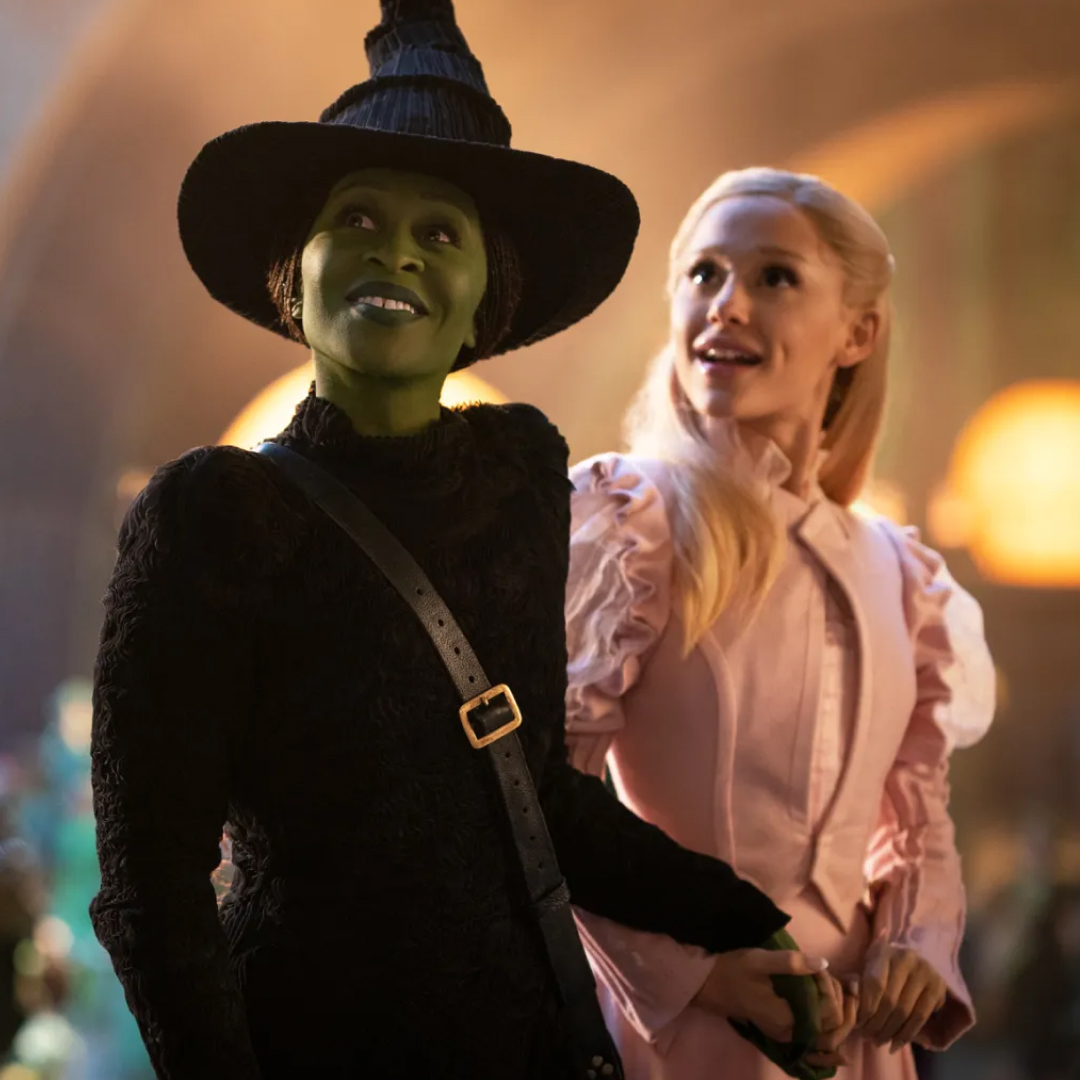 The 50 Best Movie Musicals of All Time
The 50 Best Movie Musicals of All TimeAll the dance numbers! All the show tunes!
By Amanda Mitchell